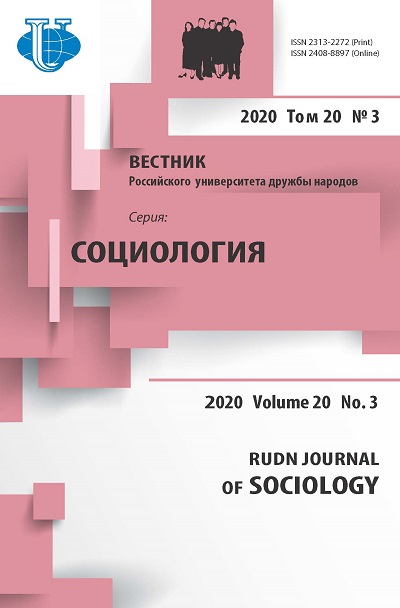Reproductive behavior of Russian women as depending on their level of education
- Authors: Archangelsky V.N1, Shulgin S.G2, Zinkina Y.V2,3
-
Affiliations:
- Research Institute of the Organization of Healthcare and Medicine Management of the Moscow Department of Healthcare
- Russian Presidential Academy of National Economy and Public Administration
- Lomonosov Moscow State University
- Issue: Vol 20, No 3 (2020)
- Pages: 546-559
- Section: Contemporary society: the urgent issues and prospects for development
- URL: https://journals.rudn.ru/sociology/article/view/24535
- DOI: https://doi.org/10.22363/2313-2272-2020-20-3-546-559
Cite item
Full Text
Abstract
There are many studies focusing on various effects of women’s education, in particular, on decline in fertility in those societies that are at the second stage of the demographic transition. However, in societies that have completed this transition, the relationship between these phenomena is changing, which requires a special study. We need to understand how women’s education affects fertility in Russia to assess the efficiency of social and demographic policies. The study aims at analyzing differences in fertility rates and women’s reproductive attitudes as depending on the level of education. The study is based on the data of the sample surveys of reproductive plans (2017 and 2012) and of the 2010 All-Russian Census. In general, the results confirm the global trend: on average, women with a high education status have fewer children than women with a lower level of education; on average, the former are older when they have the first child and tend to have larger intergenetic intervals. The analysis of reproductive attitudes and intentions shows that women with higher and postgraduate education have a larger gap between the average desired and the expected number of children. Among the factors hindering the birth of the desired number of children, women of almost all levels of education name material and housing difficulties and uncertainty about the future; however, women with higher and postgraduate education mention these reasons less often - for them, it is more important to combine motherhood and work and to have high-quality services in various spheres.
About the authors
V. N Archangelsky
Research Institute of the Organization of Healthcare and Medicine Management of the Moscow Department of Healthcare
Author for correspondence.
Email: archangelsky@yandex.ru
кандидат экономических наук, научный сотрудник Научно-исследовательского института организации здравоохранения и медицинского менеджмента
Bolshaya Tatarskaya St., 30, Moscow, 115184, RussiaS. G Shulgin
Russian Presidential Academy of National Economy and Public Administration
Email: sergey@shulgin.ru
кандидат экономических наук, заместитель заведующего Международной лабораторией демографии и человеческого капитала
Prosp. Vernadskogo, 84, Moscow, 119571, RussiaYu. V Zinkina
Russian Presidential Academy of National Economy and Public Administration; Lomonosov Moscow State University
Email: juliazin@list.ru
кандидат исторических наук, старший научный сотрудник Международной лаборатории демографии и человеческого капитала Российской академии народного хозяйства и государственной службы при Президенте Российской Федерации; научный сотрудник факультета глобальных процессов Московского государственного университета им. М.В. Ломоносова
Prosp. Vernadskogo, 84, Moscow, 119571, Russia; Leninskie Gory, 1, Moscow, 119991, RussiaReferences
- Archangelsky V.N. Faktory rozhdaemosti [Factors of Fertility]. Moscow; 2006 (In Russ.).
- Archangelsky V.N., Zinkina Yu.V., Korotaev A.V., Shulgin S.G. Sovremennye tendentsii rozhdaemosti v Rossii i vlijanie mer gosudarstvennoj podderzhki [Current fertility trends in Russia and impact of the state support measures]. Sotsiologicheskie Issledovanija. 2017; 3 (In Russ.).
- Belova V.A., Darsky L.E. Statistika mnenij v izuchenii rozhdaemosti [Statistics of Opinions in Fertility Studies]. Moscow; 1972 (In Russ.).
- Borisov V.A., Sinelnikov A.B. Brachnost i rozhdaemost v Rossii: demografichesky analiz [Nuptiality and Fertility in Russia: Demographic Analysis]. Moscow; 1995 (In Russ.).
- Vserossijskaja perepis naselenija 2010 goda. Baza mikrodannyh [2010 All-Russian Census: Microdata]. URL: http://vpnmicrodata.gks.ru/webapi/jsf/tableView/tableView.xhtml (In Russ.).
- Vyborochnoe nabljudenie reproduktivnyh planov naselenija 2012 goda. Baza mikrodannyh [Sample Survey of Population Reproductive Plans 2012: Microdata]. URL: http://std.gmcrosstata.ru/webapi/jsf/tableView/tableView.xhtml (In Russ.).
- Vyborochnoe nabljudenie reproduktivnyh planov naselenija 2017 goda. Baza mikrodannyh [Sample Survey of Population Reproductive Plans 2017: Microdata]. URL: http://std.gmcrosstata.ru/webapi/jsf/tableView/tableView.xhtml (In Russ.).
- Isupova O.G. Otnoshenie k meram stimulirovanija rozhdaemosti po dannym mikroperepisi 2015 g. [Attitudes to the fertility-stimulating measures: Data of 2015 micro-census]. Demograficheskoe Obozrenie. 2018; 5 (3) (In Russ.).
- Itogi Vserossijskoj perepisi naselenija 2002 goda. T. 12: Rozhdaemost [Results of the 2002 All-Russian Census. Vol. 12: Fertility]. Moscow; 2005 (In Russ.).
- Itogi Vserossijskoj perepisi naselenija 2010 goda. T. 10. Rozhdaemost [Results of the 2010 All-Russian Census. Vol. 10: Fertility]. Moscow; 2013 (In Russ.).
- Itogi vyborochnogo socialno-demograficheskogo obsledovanija naselenija 1985 goda [Results of the 1985 sample social-demographic survey]. Vestnik Statistiki. 1986; 9 (In Russ.).
- Kalachina O.S. Vlijanie urovnja obrazovanija na reproduktivnye ustanovki naselenija v Respublike Mordovija [Impact of the education level on reproductive intentions in the Republic of Mordovia]. Regionalnaja differentsiatsija i konsolidatsija socialnogo prostranstva Rossii: realii i novye vyzovy. Saransk; 2015 (In Russ.).
- Skryabina Ya., Shamsutdinova N. Rozhdaemost i realizatsija reproduktivnyh ustanovok v Respublike Bashkortostan [Fertility and realization of reproductive intentions in the Republic of Bashkortostan]. Ekonomika i Upravlenie. 2018; 6 (In Russ.).
- Sostojanie v brake i rozhdaemost v Rossii: po dannym mikroperepisi naselenija 1994 g. [Marriages and Fertility in Russia: Data of the 1994 Micro-Census]. Moscow; 1995 (In Russ.)
- Tyndik A.O. Reproduktivnye ustanovki i ih realizatsija v sovremennoj Rossii [Reproductive intentions and their realization in contemporary Russia]. Zhurnal Issledovanij Sotsialnoj Politiki. 2012; 10 (3) (In Russ.).
- Coale A.J., Watkins S.C. (Eds.). The Decline of Fertility in Europe. Princeton; 1986.














